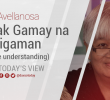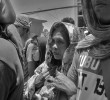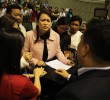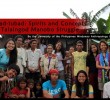First of all, warning on blatant attempts to rig the recent the Lanao polls, we have no reason to disagree with Amando Doronila that such bad practice can �easily trigger the collapse of the century-old electoral system�. But this frame of analysis treats Philippine democracy as a method. That is why he goes on to say, its viability precariously rest on electoralism. �Obviously poll-rigging schemes are mainly plotted in Manila,� argues the Muslim lawyer Mehol Sadain who once served as a Comelec commissioner. The final step is �carried out by �operators� who flock to Mindanao during election seasons.� It is the peak of manipulative corruption because the cornerstones of balloting — freedom and equality — are repressed and concealed.
Secondly, it is politically incorrect for political analysts to single out Muslim Mindanao just to tag it the main theater of electoral frauds in the Philippine polls. People often ask me why there is no other viable option without national politicians taking charge of it. When regional specialist Kit Collier and Malcolm Cook look at Mindanao �a gamble worth taking� in terms of risk factor, the more paradoxical danger is that �localized state failure provides national political benefits.� None of the senatorial slates or any of the political parties put it in their election platform. Is there something more to it than money? Curiously I have talked to a lot of observers, and the hypocrisy of it is nothing short of outrageous pledging of the plight of conflict-affected areas in Mindanao.
Thirdly, what exactly is the point about the politico-strategic interests if not to undermine the arguments for retaining an armed body to fight for self-determination of the Bangsamoro people? Pragmatically, though, the lessons learned from the MNLF�s failure to vie and bid as electoral force only serve to resolve the current MILF�s stance of abstentionism from electoral politics. Those who argue for the MILF post-conflict entry into electoral politics somewhat resembling IRA-Sinn-Fein slogan �the Armalite and ballot box� are overcome by realities of failed electoral process in the field.
Suffice is it to stress, aside from the expected support funds, most party local candidates run on the administration ticket to be entitled to the important election documents — statements of votes (SoVs), certificates of canvass (CoCs), election returns (ERs). All controversies or anomalies surrounding results of the election arise from the preparation to filling out these forms. But equally critical the proclamations of winning candidates or electoral protests hinge on their proper completion. It stands to reason why this stage is a watershed in jurisprudence for now enters lawyers and retainers. What initially starts as anomalous electoralism turns into lucre for legalism via �chamber lawyering� lurking in the background. What happens in deferred electoralism is that brokers or operators may or may not be tolerated by Comelec but opposing candidates try to cut deals from under them.
To talk about periodic failures of elections in Bangsamoro areas is never to talk about “numbers of ballots teachers fill out.” Rather, it is about the miseducation of individuals on electoralism; for “sanctity of ballots” never legitimizes any “elective despotism.” Protection of freedom is less secure in the hands of the powerful than in the care of people who have the least desire to usurp it.
2007 Elections, Analysis
![[STANDPOINT] Illegal drugs and the NIMBY mindset](https://davaotoday.com/wp-content/uploads/2016/09/Mags-Maglana_UPMIN-Sept.-20-110x100.jpg)








